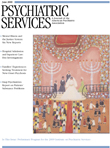Persons with mental illnesses who are from ethnic minority groups are underserved in multicultural Canada and the United States. Ethnic minorities with serious mental illness have above-average rates of homelessness, emergency visits, hospitalizations, and legal involvement, resulting in high risks of morbidity and relapse. Matching clients with mental health service providers in language and cultural backgrounds is effective in improving care for ethnic minority groups.
Toronto is one of the most culturally diverse cities in the world: 37% (1.7 million) of its population, versus 17% in Canada, is from a minority group. In 1999 the Ontario Ministry of Health funded Toronto's Mount Sinai Hospital Assertive Community Treatment (ACT) team—developed in partnership with Hong Fook Mental Health Association, a community agency—to provide intensive, community-based services tailored to ethnic minority persons with serious mental illness.
The ACT team was set up in the heart of Chinatown. It has high fidelity to the ACT model. Its innovations are in the operational aspects of the team. Of the 90 clients, 45% are Chinese (80% Cantonese speaking; 20% Mandarin), 21% Tamil, 16% Vietnamese, 7% Korean or Japanese, and 6% Afro-Caribbean, and 5% are from other minority groups. Seventy-two percent of the clients live in boarding homes or supported housing, 16% live with family, and 12% live independently. Ninety-four percent have schizophrenia or schizoaffective disorder; 6% have bipolar affective disorder. English is not the first language for 82% of the clients, 32% are unable to communicate in English, and 35% have no family members in Canada. Eighty percent of the clients are first-generation immigrants from Asian countries. Of this group 58% are unfamiliar and uncomfortable with mainstream culture or with negotiating activities of daily living, such as getting telephone services, obtaining financial assistance, or finding housing. Informed by these facts, team members are selected to match the clients' language and cultural backgrounds: ten of the 11 staff members speak one of the main target group languages—Chinese, Tamil, Vietnamese, or Korean. Sixty-seven percent of the clients are matched with workers in both language and ethnicity and communicate in languages other than English.
In addition to the classic ACT services in pharmacotherapy and psychosocial rehabilitation, the ACT team also tailors services to meet the specific cultural needs of the clients. There are restaurant outings for Chinese noodles and groups for practicing yoga, baking, exercising, and singing karaoke. There is an annual music festival as well as seasonal and New Year's celebrations, including Chinese, Vietnamese, and Tamil festivals.
The clients' wide range of views concerning the nature of mental illness (overseen by ancestral gods and astrology) and treatment approaches are assessed by the explanatory model pioneered by cultural psychiatrist Arthur Kleinman. The responses to model questions yield rich information about the clients' perceptions, expectations, insight, past experiences, and personal healing practices, which in turn inform the team's treatment plans. The team also systematically inquires about cultural identity and culturally relevant issues, such as level of community stigma about mental illness, role of family, social status changes after immigration, and subjective experience of discrimination, social defeat, psychosomatic expression of illness and suffering, and exposure to war and trauma.
In outcome studies, the team compared clinical records of clients one year before ACT team admission and one year after and found a statistically significant 83% reduction in total hospital days (from 7,095 to 1,221 days) and a 68% reduction in the number of patients hospitalized more than 30 days (from 44 to 14) ( Psychiatric Services 56:1053–1055, 2005). The Brief Psychiatric Rating Scale showed moderate but significant improvement in psychopathology. Satisfaction surveys of clients and families found that 91% of clients (N=61) were satisfied or very satisfied and that 100% of families (N=33) were satisfied or very satisfied with the services. With the McFarlane model of family psychoeducation translated into the primary languages of the clients, we found significant positive results in families' knowledge of mental illness, empathy for their ill family member, and lowered rejection of the clients.
The Mount Sinai ACT team appears to be the only ACT team in the field of community psychiatry that specifically serves ethnocultural populations. In 2006 the team won recognition from the American Psychiatric Foundation and the Ontario Hospital Association for advancing minority mental health.

